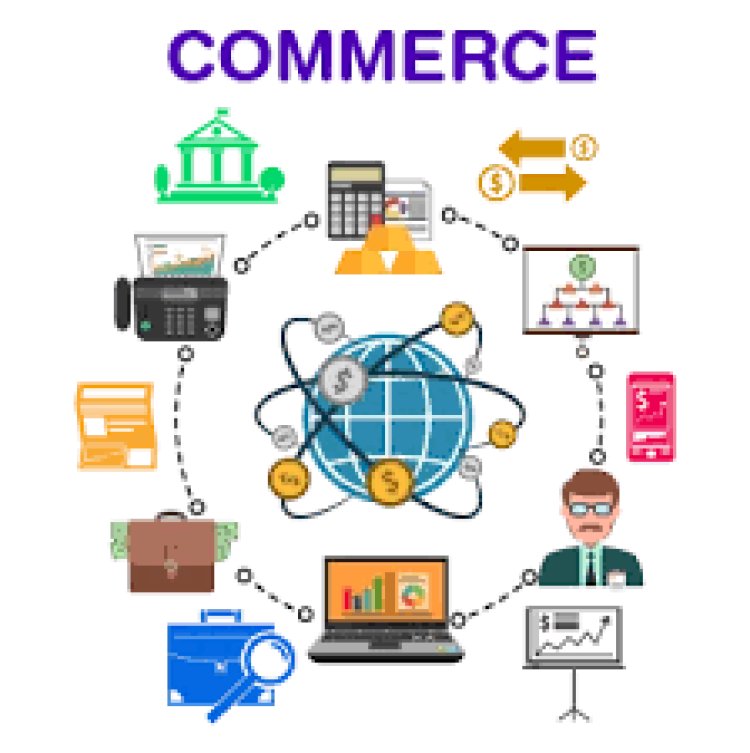Commerce Definition in Business
Large-scale trading of products and services is known as "commerce." The term "Commerce" refers to any economic activity in which money is exchanged for goods or services.

Commerce: What It Is, How It Differs From Business and Trade
:max_bytes(150000):strip_icc():format(webp)/commerce_definition_final_0831-666869ec162e471d89a8f4e8ef50d841.jpg)
What Is Commerce?
The movement of products and services between different entities is known as commerce. The term refers to the sector of the corporate world concerned with the exchange of goods rather than their creation, distribution, or promotion.
The term "commerce" is often used to describe the buying and selling of goods and services for money or other valuable consideration.
In the broadest sense, it is the responsibility of governments to oversee their economies so that they can provide for their people through the creation of jobs and the provision of necessary products and services.
MAIN POINTS
- When ancient people started trading products and services for mutual benefit, commerce was born.
- These days, when people talk about commerce, they usually mean large-scale exchanges of commodities and services.
- The distribution of goods is the primary emphasis of the commercial sector of the business world.
- A transaction occurs when one item is sold to another. Commerce is the general term for economic exchanges.
- Internet-based product and service exchanges are what we call "e-commerce," a subset of traditional commercial activity.
Understanding Commerce
Humans have engaged in commercial activity ever since they began bartering. Humans have always strived to make it easier to trade products and services with one another, from the earliest days of bartering to the invention of currencies and the establishment of trade routes.
These days, when people talk about commerce, they usually mean business deals on a massive scale. A consumer's sale or purchase of a particular good is called a transaction, while the broader set of deals involving that good is sometimes called commerce.
These days, most business is done on a global scale, involving the exchange of goods and services between different countries.
Business and commerce are distinct but related concepts. The distribution of goods and services is the sole aspect of business that has anything to do with commerce. Just that covers a wide range of functions, from the administrative to the political to the regulatory to the legal to the social to the economic.
Commerce vs. Business vs. Trade
Although they sound similar, these concepts are distinct.
Business
A business enterprise is any activity that seeks to generate a financial return.
Business activity comprises selling products and services, but also encompasses the entire production and distribution chain.
Filling up at the gas station is the final step in a long chain of events that began with oil exploration, continued with crude oil extraction via drilling, and finally reached your gas tank via transportation, refining, and distribution. It took the cooperation of many people to make that happen.
Commerce
The term "commerce" is used to describe the buying and selling of goods and services between businesses. When you filled up your gas tank and made a purchase, you participated in commercial activity.
There was additional business activity to be seen along the route. For instance, the oil was sold in large quantities to a petroleum company or companies. That, too, was a purely business deal.
Trade
There is a subtle but important difference between commerce and trade. Both involve the immediate and explicit transfer of resources between individuals for the purpose of mutual benefit. (These days, we generally mean "something of value" to be monetary.)
There are, however, subtle distinctions in how they're employed:
- For a product to be manufactured, it would require a number of separate business interactions, or "commerce," as illustrated above. The final step in any business is selling the finished product to the end user.
- Only the final transaction between a seller and a consumer for a finished good may be considered a trade. Similar to how commerce is a subset of business, trade can be thought of in this way.
Regulating Commerce
When run efficiently, commerce raises a nation's standard of living and boosts its international status. Unchecked commercial activity, however, can lead to the abuse of power by major corporations that, in turn, can have detrimental effects on the general public.
The United States Department of Commerce is one example of a national government agency that promotes and regulates commercial activity.
Large multi-national corporations oversee international trade. For instance, the World Trade Organization (WTO) and its forerunner the General Agreement on Tariffs and Trade (GATT) formulated guidelines for tariffs pertaining to cross-border trade. The rules are designed to make business easier for member countries and create a level playing field.
The Rise of E-commerce
In the twenty-first century, the concept of trade has broadened to include e-commerce. Any commercial or business transaction that involves the transmission of financial data via the Internet is considered to be an example of electronic commerce, or e-commerce.
With the advent of the Internet, business practices shifted. Both the importer and the exporter had to overcome logistical challenges in the past while importing or exporting goods. Larger businesses with economies of scale are the only ones able to profit from exporting.
With the advent of e-commerce, local merchants now have the opportunity to reach out to customers all over the world.
It might be difficult for small firms in the United States to sell worldwide, but export management organizations can aid with the process. Export trading organizations aid SMBs by locating suitable foreign clients and suitable local suppliers. Importers and exporters are independent businesspeople who source products from domestic or international manufacturers and then resell those products to other customers.
Is Commerce the Same As Business?
Contrary to popular belief, commerce is not synonymous with business but rather falls within that umbrella. Commerce refers to the distribution aspect of a firm, including the distribution of goods and services, while business include sourcing, manufacturing, production, and marketing.
What Are the Different Types of E-commerce?
E-commerce can be broken down into three categories:
- The term "business to business" (B2B) refers to transactions involving just businesses.
- Direct sales to end users characterize the retail sector.
- Online marketplaces like eBay and Facebook's Marketplace facilitate this kind of consumer-to-consumer trade.
What Is E-commerce?
To sell products and services online and have the transaction completed is an example of electronic commerce.
Online shopping offers an alternative to traditional shopping at a physical store. Many retailers today let customers choose between making in-store and online purchases.
Trade on the Go. Anywhere, Anytime
You may start trading crypto assets on one of the biggest marketplaces right now. Benefit from low trading costs and dependable client service, all in a risk-free environment. You'll have access to Binance's helpful tools, which include an easy-to-read trade history, automated investment management, price charts, and free currency conversions. Sign up for free today and join the global crypto market, home to millions of traders and investors.












